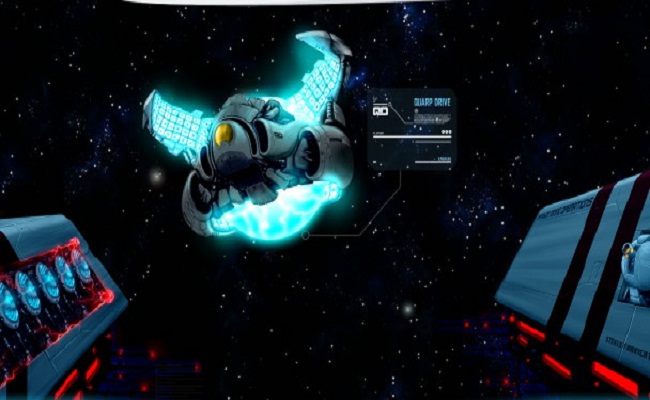Reviewers don’t often find themselves discussing “PSN Minis,” much less writing an article about them. Typified by miniscule content and an equally diminutive price, Minis have often been lumped in with “dime a dozen” IOS games, and, in practically all cases, rightfully so. The growing trend in micro-transactions has been widely criticized by those who brand the concept as “fast food gaming,” and I am among such critics. The idea of downscaling gaming into bite sized chunks for instant gratification, at the expense of the advancement of immersion and technology, does not strike me as a track that is beneficial to games as an art form. However, this is not to say that there exist no IOS games or “Minis” of decent or even exceptional quality. Among the mounds of trite puzzle games and over-glorified flash games, there occasionally comes a game that surprises everyone and quells their vitriol towards the “micro” business model.
This brings me to the topic at hand. A new Mini called Velocity has been released for the PS3, PS Vita, and PSP systems (for Playstation Plus members only, until May 14th). You might have heard of it, as it has created a moderate buzz, being one of the few Minis to receive attention from mainstream critics. There is a reason for such notoriety, as Velocity establishes new, daunting standards for its fellow “micro” titles, on all platforms, and demonstrates what such small titles can accomplish when appealing solely to the hardcore audience.
Velocity is a scrolling, space-themed shooter with a 16 bit presentation and is reminiscent of genre classics on the Super Nintendo, such as Gradius and R-type, not to mention the oceans of such arcade games throughout the 80s and 90s. Those who grew up with the genre will feel immediately at home, as the developer, Futurlab (the creators of Coconut Dodge) set out to create a robust, authentic 16 bit shooter experience. In this regard, they exceed every expectation. Velocity is a love letter to the scrolling shooters of the 90s in the same way that Fez is a love letter to 2D platformers. Both games are raw, calculated nostalgia, with enough of their own innovations to leave a unique footprint in the genre.
Velocity is set 200 years in the future, in the midst of a space fleet, ravaged and stranded by a recent black hole. To make matters worse, an enemy faction has taken this opportunity to launch an assault on the defenseless fleet. In response to this disaster, the player is sent, in a versatile rescue craft, to extract the survivors.
The stranded citizens are deployed throughout the stage in pods, which the player collects. To accomplish this mission, there are numerous weapons and tools at the player’s disposal. First and foremost is the ability to teleport, which is used to negate obstructions and work advantageously in moments of intense combat. The ship has a standard rapid-fire attack along with other obligatory powerups. Bombs are also a useful tool, as they are able to fire in all directions. Last, but certainly not least, is the ship’s ability to boost, which also increases the scroll speed of the screen. Few scrolling shooters have offered such an intuitive and well-executed method of controlling the pace of the action.
The mechanics of the game are complimented by intricate and varied level design. While somewhat repetitive aesthetically, the structure of the levels is, thankfully, diverse (throughout the game’s solid 50 level campaign), always keeping the player on their toes. On top of that, there are countless hideaways and alternate paths to give the player a sense of discovery and a fair amount of replay value. The game lends itself to speed-runs, as the option to blast through the level at top speed is always present, only limited by the player’s reflexes and knowledge. In this way, the game tempts and goads the player to master it, giving an underlying sense of self-competition. Few singleplayer games today give such a compelling call to “mastery” (much less Minis!).
The combat in the game is also well executed, complimented by the game’s deep mechanics. I found myself teleporting into the midst of enemy ships and unleashing hell with my spread-fire gun, or warping to safety, when faced with a seemingly unavoidable rain of enemy bullet-fire. Well-timed bomb tossing is also advantageous. The responsive controls allow a player, with enough aptitude, to breeze through legions of turrets and obstacles in a streamlined manner.
On top of all that, the game does not falter in presentation. It runs at a silky smooth frame rate and has what will certainly be one of the best soundtracks of the year. Joris De Man (of Killzone fame) constructs chiptune/techno melodies that practically bring a tear to the eye of any aspiring “retro gamer.”
Velocity despite its size and price, presents a wholly enjoyable, standout experience. It even gives “full” PSN shooters like Pixeljunk and Söldner-X a run for their money. It is difficult to wrap one’s mind around the fact that all of this could come out of a mere “Mini.” I can scarcely believe it. It truly shows what is possible when micro-transaction games are formulated with hardcore gamers as the target audience. Velocity shows that “micro-gaming” is not an inherently broken model, just a tragically misguided one. Perhaps not fiscally, as the profit margins for IOS games indicate, but in terms of creating legitimate gaming experiences that will be remembered, years down the road. Velocity is one of the select few that accomplish this, and I sincerely hope it is successful enough that others try to follow in its place. As a game, and as my official score, I deem it a 9/10. However, In terms of value and content provided, given the price range (under 5 USD), it is an undeniable 10/10 and a “must own” for anyone with a Sony system.



0 Comments